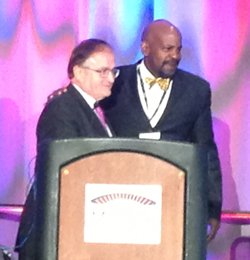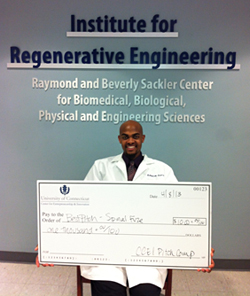Earlier this year, I received the 2012 Mentor Award from the American Association for the Advancement of Science for mentoring students in biomedical engineering. As a follow-up to that, Dr. Aira Nouri asked me to participate in a brief discussion about my views on the importance of mentoring. Our conversation has been posted on the AAAS website. Mentoring is, for me, one of the most important legacies we leave behind us; and I urge everyone to share both their knowledge and themselves with those who will follow and continue the work we’ve begun.
Month: April 2013
Technology Innovation and Development Award
 On April 11, I was so humbled by receiving the Technology Innovation and Development Award from the Society for Biomaterials (SFB). The award ceremony was held at the SFB annual meeting in Boston, MA. This award recognizes an individual or team who provided key scientific and technical innovation and leadership in a novel product in which biomaterials played an important and enabling role.
On April 11, I was so humbled by receiving the Technology Innovation and Development Award from the Society for Biomaterials (SFB). The award ceremony was held at the SFB annual meeting in Boston, MA. This award recognizes an individual or team who provided key scientific and technical innovation and leadership in a novel product in which biomaterials played an important and enabling role.
For more than three decades, I have conducted research studies on biomaterials for musculoskeletal tissue engineering, nanotechnology, and drug delivery. I began research in this field in the late 1980s, and was influenced by my Ph.D. mentor, Dr. Robert Langer, an Institution Professor at M.I.T. On behalf of my research team, I thank you sincerely. To be selected by the SFB is indeed a great honor.
The CCEI Start-Up Challenge Pitch Competition
 The Connecticut Center for Entrepreneurship and Innovation (CCEI) held its Start-Up Challenge Pitch Competition on April 8 on the Storrs campus. Open to students on all UConn campuses, CCEI awarded a total of $10,000 in prize money to individuals and/or teams across ten categories. Entries ranged from mobile apps for improved access to educational resources to novel material design for improved transportation infrastructure. The organizers challenged students to prepare a 90-second business idea pitch followed by a 2-minute Q&A session.
The Connecticut Center for Entrepreneurship and Innovation (CCEI) held its Start-Up Challenge Pitch Competition on April 8 on the Storrs campus. Open to students on all UConn campuses, CCEI awarded a total of $10,000 in prize money to individuals and/or teams across ten categories. Entries ranged from mobile apps for improved access to educational resources to novel material design for improved transportation infrastructure. The organizers challenged students to prepare a 90-second business idea pitch followed by a 2-minute Q&A session.
I am very proud to announce that our pitch for a novel interbody fusion device won “Best Pitch.” Nicknamed SpineFuze, this is a biodegradable, natural polymer-based interbody fusion device for spinal disc surgery. The team also plans to submit an additional entry for the upcoming written business-plan competition.
The business pitch was delivered by Matthew Harmon, a current 3rd-year Ph.D. student in the Institute for Regenerative Engineering. Matthew is completing his Ph.D. before returning to medical school to continue his pursuit of a career as a physician scientist in orthopaedics. His current research interests involve novel material design for the treatment of spine-related orthopaedic injuries and pathologies.
NSF Louis Stokes Alliance for Minority Participation (LSAMP) Program
I am happy to announce that Ms. Deborah Dorcemus, an IRE graduate student, was recently awarded the National Science Foundation’s prestigious LSAMP Bridge to the Doctorate Fellowship. The LSAMP program is funded by the National Science Foundation and focuses on strengthen the participation, representation and success of underrepresented minorities in the science, technology, engineering, and mathematics (STEM) fields. Fellows receive two years of funding under the program with an additional three years provided by their advisors.
After graduating high school in 2008, Deborah chose to attend the University of Connecticut for her degree in Biomedical Engineering. Throughout her four years of undergraduate work, Deborah was heavily involved with several organizations that promote the professional development and academic success of students and minorities interested in the STEM fields. Deborah also held the positions of secretary, vice president, and president of the UConn chapter of the National Society of Black Engineers.
Upon receiving her Bachelor of Science in May 2012, she decided to continue on her academic path and enrolled in UConn’s Graduate program for her Master’s Degree in Biomedical Engineering with a focus in Tissue Engineering and Regenerative Medicine. With the support of her advisor, Dr. Syam P. Nukavarapu (IRE faculty member), she is nearing completion of her first year of graduate studies. In addition to her lab and school work, Deborah volunteers with the Engineering Graduate Dean’s Office, under the supervision of Aida Ghiaei, and works with students from technical high schools who come to UConn in hopes of becoming engineers. Deborah’s thesis work involves utilizing tissue engineering strategies to develop 3D matrixes that would regenerate osteochondral (functional bone and cartilage) tissue. In order to achieve this, she will use a polymer-hydrogel matrix to deliver growth factors that would cue the tissue to a specific formation. In the end, this structure will serve to replace damaged or arthritic tissue which is an area of great need among the elderly as well as athletes.